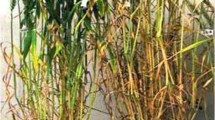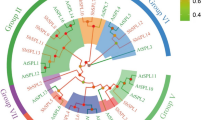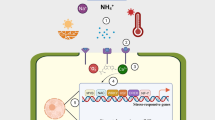Abstract
Heat shock proteins (Hsps) and transcription factors (Hsfs) are considered as an important class of genes involved in plant’s response to heat stress. To elucidate the genotypic differences in rice in response to high temperature stress, plants were exposed to different levels of temperature ranging from 37 °C to 48 °C. The expression of genes belonging to Hsps and Hsf category were analyzed initially by digital microarray and later by semi-quantitative RT-PCR analysis using leaf tissues. Significant variations in the level of expression, timing of gene activation and maximum transcript accumulation were recorded among the set of rice genotypes selected based on their origin and phenotypic data recorded for heat stress. Genes encoding small Hsps (OsHsp 16, OsHsp 17.7 and OsHsp 18), OsHsp 70 DnaK, OsHsp 100 and OsHsf A2a showed strong induction upon heat stress with varied pattern and degrees. Out of six rice genotypes, two R-1389-RF-42 and Nagina22 (check heat tolerant) showed higher gene expression levels for most of the Hsps and Hsf genes tested with prominently better way of regulation which contributed to their greater heat tolerance and surmount the stress. In silico promoter analysis showed that strongly induced genes contain upstream regulatory elements corresponding to different stresses including heat shock, a good correlation was noted between in silico profiling of elements and their corresponding expression pattern. Information of such genotypic variation in expression levels of important candidate genes under heat stress supplemented with related field performance data could potentially be exploited in breeding programs for thermal stress tolerance.





Similar content being viewed by others
Abbreviations
- HSR:
-
Heat shock response
- Hsf:
-
Heat stress transcription factors
- Hsp:
-
Heat shock proteins
- RT-PCR:
-
Reverse transcription PCR
- CT:
-
Canopy temperature
References
Agarwal M, Sahi C, Katiyar-Agarwal S, Agarwal S, Young T, Gallie DR, Sharma VM, Ganesan K, Grover A (2003) Molecular characterization of rice hsp101: complementation of yeast hsp104 mutation by disaggregation of protein granules and differential expression in indica and japonica rice types. Plant Mol Biol 51(4):543–553
Ahn YJ, Claussen K, Zimmerman JL (2004) Genotypic differences in the heat-shock response and thermotolerance in four potato cultivars. Plant Sci 166:901–911
Almoguera C, Prieto-Dapena P, Jordano J (1998) Dual regulation of a heat shock promoter during embryogenesis: stage-dependent role of heat shock elements. Plant J 13(4):437–446
Blumenthal C, Bekes F, Wrigley CW, Barlow EWR (1990) The acquisition and maintenance of thermotolerance in Australian wheats. Aust J Plant Physiol 17(1):37–47
Davidson JF, Whyte B, Bissinger PH, Schiestl RH (1996) Oxidative stress is involved in heat-induced cell death in Saccharomyces cerevisiae Proc. Natl Acad Sci USA 93:5116–5121
Efeoglu B (2009) Heat shock proteins and heat shock response in plants. GU J Sci 22(2):67–75
Giorno F, Wolters-Arts M, Grillo S, Scharf KD, Vriezen WH, Mariani C (2010) Developmental and heat stress-regulated expression of HsfA2 and small heat shock proteins in tomato anthers. J Exp Bot 61(2):453–462
Grover A, Aggarwal PK, Kapoor A, Katiyar-Agarwal S, Agarwal M, Chandramouli A (2003) Addressing abiotic stresses in agriculture through transgenic technology. Curr Sci 84:355–367
Grover A, Chandramouli A, Agarwal S, Katiyar-Agarwal S, Agarwal M, Sahi C (2009) Transgenic rice for tolerance against abiotic stresses. In: Datta SK (ed) Rice improvement in the Genomic Era. Hawarth Press, USA, pp 237–267
Guan JC, Jinn TL, Yeh CH, Feng SP, Chen YM, Lin CY (2004) Characterization of the genomic structures and selective expression profiles of nine class I small heat shock protein genes clustered on two chromosomes in rice (Oryza sativa L.). Plant Mol Biol 56(5):795–809
Gupta SC, Sharma A, Mishra M, Mishra R, Chowdhuri DK (2010) Heat shock proteins in toxicology: how close and how far? Life Sci 86:377–384
Hu W, Hu G, Han B (2009) Genome-wide survey and expression profiling of heat shock proteins and heat shock factors revealed overlapped and stress specific response under abiotic stresses in rice. Plant Sci 176:583–590
Huang B, Xu C (2008) Identification and characterization of proteins associated with plant tolerance to heat stress. J Integr Plant Biol 50:1230–1237
Iba K (2002) Acclimative response to temperature stress in higher plants: approaches of genetic to high temperature stress in diverse plant genera. Annu Rev Plant Biol 53:225–45
IPCC (2007) Summary for policy makers. In Climate change 2007, the physical science basis. Intergovernmental Panel on Climate Change. Geneva, Switzerland, pp 1–18
IRGSP (2005) The map-based sequence of the rice genome. Nature 436(7052):793–800
Jagadish SVK, Muthurajan R, Oane R, Wheeler TR, Heuer S, Bennett J, Craufurd PQ (2010) Physiological and proteomic approaches to address heat tolerance during anthesis in rice (Oryza sativa L.). J Exp Bot 61:143–156
Kurek I, Chang TK, Bertain SM, Madrigal A, Liu L, Lassner MW, Zhu G (2007) Enhanced thermostability of Arabidopsis Rubisco activase improves photosynthesis and growth rates under moderate heat stress. Plant Cell 19:3230–3241
Lescot M, Déhais P, Thijs G, Marchal K, Moreau Y, Van de Peer Y, Rouzé P, Rombauts S (2002) PlantCARE, a database of plant cis-acting regulatory elements and a portal to tools for in silico analysis of promoter sequences. Nucleic Acids Res 30(1):325–327
Liu JG, Qin QL, Zhang Z, Peng RH, Xiong AS, Chen JM, Yao QH (2009) OsHSF7 gene in rice, Oryza sativa L., encodes a transcription factor that functions as a high temperature receptive and responsive factor. Bichem Mol Biol Reports 42(1):16–21
Liu AL, Zou J, Zhang XW, Zhou XY, Wang WF, Xiong XY, Chen LY, Chen XB (2010) Expression profiles of class a rice heat shock transcription factor genes under abiotic stresses. J Plant Biol 53:142–149
Lohmann C, Schumacher GE, Wunderlich M, Schoffl F (2004) Two different heat shock transcription factors regulate immediate early expression of stress genes in Arabidopsis. Mol Gen Genomics 271:11–21
Maestri E, Klueva N, Perrotta C, Gulli M, Nguyen HJ, Marmiroli N (2002) Molecular genetics of heat tolerance and heat shock proteins in cereals. Plant Mol Biol 48:667–681
Milioni D, Franz G, Sung R, Hatzopoulos P (2001) Gene expression during heat-shock in embryogenic carrot cell lines. Plant Cell Tissue Organ Culture 65:221–228
Miller G, Mittler R (2006) Could heat shock transcription factors function as hydrogen peroxide sensors in plants? Annal Bot (Lond) 98(2):279–288
Mittal D, Chakrabarti S, Sarkar A, Singh A, Grover A (2009) Heat shock factor gene family in rice: genomic organization and transcript expression profiling in response to high temperature, low temperature and oxidative stresses. Plant Physiol Biochem 47(9):785–95
Mittal D, Enoki Y, Lavania D, Singh A, Sakurai H, Grover G (2011) Binding affinities and interactions among different heat shock element types and heat shock factors in rice (Oryza sativa L.). FEBS Journal 278(17):3076–3085
Ogawa D, Kazuo Y, Takumi N (2007) High-level overexpression of the Arabidopsis HsfA2 gene confers not only increased themotolerance but also salt/osmotic stress tolerance and enhanced callus growth. J Exp Bot 58(12):3373–3383
Pareek A, Singla SL, Grover A (1995) Immunological evidence for accumulation of two high-molecular-weight (104 and 90 kDa) HSPs in response to different stresses in rice and in response to high temperature stress in diverse plant genera. Plant Mol Biol 29(2):293–301
Parvez S, Rather AG (2007) QTL analysis in rice improvement: concept, methodology and application. Biotechnology 6:1–13
Pavli OI, Ghikas DV, Katsiotis A, Skaracis GN (2011) Differential expression of heat shock protein genes in sorghum (Sorghum bicolor L.) genotypes under heat stress. Austral J Crop Sci 5(5):511–515
Qin D, Wu H, Peng H, Yao Y, Ni Z, Li Z, Zhou C, Sun Q (2008) Heat stress-responsive transcriptome analysis in heat susceptible and tolerant wheat (Triticum aestivum L.) by using Wheat Genome Array. BMC Genomics 9:432
Ray PK (1999) Stress genes and species survival. Mol Cell Biochem 196:117–123
Sarkar NK, Kim YK, Grover A (2009) Rice sHsp genes: genomic organization and expression profiling under stress and development. BMC 10:393. doi:10.1186/1471-2164-10-393
Shah F, Huang J, Cui K, Nie L, Shah T, Chen C, Wang K (2011) Impact of high-temperature stress on rice plant and its traits related to tolerance. J Agric Sci 1–12. doi:10.1017/S0021859611000360
Swindell WR, Huebner M, Weber AP (2007) Transcriptional profiling of Arabidopsis heat shock proteins and transcription factors reveals extensive overlap between heat and non-heat stress response pathways. BMC Genomics 8:125. doi:10.1186/1471-2164-8125
Vierling E (1991) The roles of heat shock proteins in plants. Annu Rev Plant Physiol Plant Mol Biol 42:579–620
Wahid A, Gelani S, Ashraf M, Foolad MR (2007) Heat tolerance in plants: an overview. Environ Exp Bot 61:199–223
Wang C, Zhang Q, Shou H (2009) Identification and expression analysis of OsHsfs in rice. J Zhejiang Univ Sci B 10(4):291–300
Xu Y, Zhan C, Huang B (2011) Heat shock proteins in association with heat tolerance in grasses. Int J Proteomics. doi:10.1155/2011/529648
Yokotani N, Ichikawa T, Kondou Y, Matsui M, Hirochika H, Iwabuchi M, Oda K (2008) Planta 227(5):957–67
Zimmermann P, Laule O, Schmitz J, Hruz T, Bleuler S, Gruissem W (2008) Genevestigator transcriptome meta-analysis and biomarker search using rice and Barley gene expression databases. Mol Plant 1(5):851–857
Acknowledgments
The authors wish to thank the National Agricultural Innovation Project (NAIP) of Indian Council for Agricultural Research (ICAR), New Delhi, India for financial support for undertaking this research work.
Author information
Authors and Affiliations
Corresponding author
Rights and permissions
About this article
Cite this article
Chandel, G., Dubey, M. & Meena, R. Differential expression of heat shock proteins and heat stress transcription factor genes in rice exposed to different levels of heat stress. J. Plant Biochem. Biotechnol. 22, 277–285 (2013). https://doi.org/10.1007/s13562-012-0156-8
Received:
Accepted:
Published:
Issue Date:
DOI: https://doi.org/10.1007/s13562-012-0156-8




